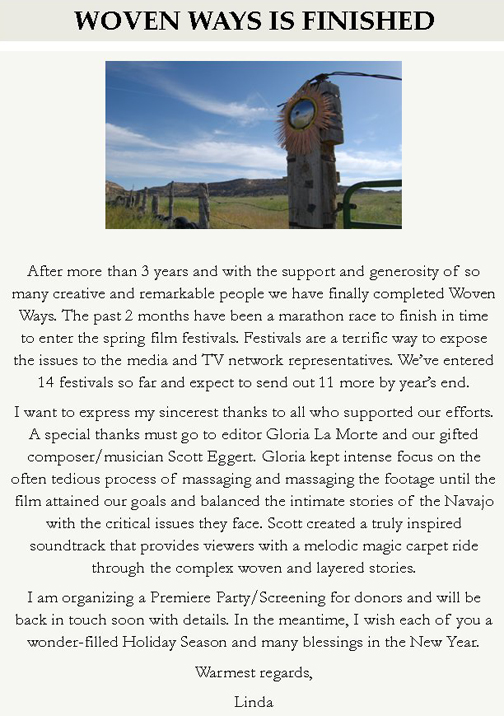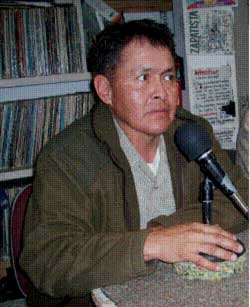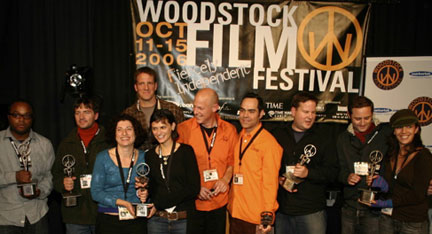 |
|||||||||||||
| NEWS | |||||||||||||
| JUNE 2008 NEWS ARTICLES NEW MEXICO GOVERNOR AND ATTORNEY GENERAL CRITICIZE EPA (SANTA FE, NM) New Mexico Governor Bill Richardson and Attorney General Gary King today criticized the U.S. Environmental Protection Agency (EPA) for violating the federal Clean Air Act by fast tracking a permit for the proposed Desert Rock coal fired-power plant without completing the proper reviews on important air pollution issues. Governor Richardson and Attorney General King assert in their letter that EPA’s recent proposal to expedite the permitting decision for the proposed plant without conducting required environmental analyses of hazardous air pollutants could have severe negative impacts on air quality for New Mexicans and others in the region. The proposed plant, under the jurisdiction of the Navajo Nation, would be in northwest New Mexico. "EPA is overlooking air quality protections in federal law by fast tracking this permit,” Governor Richardson said. “This is a grave mistake. The children of northwestern New Mexico should not have to be exposed to higher levels of mercury and lead in the air they breathe. New Mexico and the nation must be making (click to read entire article as well as joint letter) (RIO RANCHO, NM) Responding to congressional demands and a 2006 series in the Los Angeles Times, the federal government has laid out a $161 million plan to prevent the spread of radioactive contamination on sites across the Navajo Nation. The plan, released earlier this month to the House Committee of Oversight and Government Reform and its chairman, Rep. Henry Waxman, D-Calif., calls for the clean up of the Northeast Church Rock Mine near Gallup as well as a survey of structures and wells for contamination. Despite coming decades after the Cold War-era uranium mining and the legacy of sickness and public health hazards it left in its wake, federal officials call the plan a landmark. (click to read entire article) |
|||||||||||||
|
CONTACT Woven Ways © 2008 |
|||||||||||||
|
|||||||||||||
| PRODUCER'S JOURNAL NOTES - MARCH 2008
Thanks to the generosity of donors, we're taking Woven Ways on the road again, as momentum builds for the issues the film raises. We're very excited to be heading back to the Navajo Reservatio next month for several important screenings. The trip begins at St. Michael's High School in the Navajo Nation Capital in Window Rock, Arizona. Teachers at the school have organized a screening and a discussion for Navajo students. From there it's on to Santa Fe for the National Trival Environmental Conference, where the film will be used to introduce some of the threats brought about by energy resource projects. Other screenings include a film festival in Grants, New Mexico, and a major media event where the Navajos featured in the film and leaders from the grassroots organizations they represent will speak at a press conference for local and regional press and media outlets. In May, it's on to Washington, where Woven Ways has been accepted into two film festivals. The Hazel Wolf Environmental Film Festival in Seattle brings compelling environmental stories from around the world. The Rainier Film Festival will take place at the base of Mt. Rainier in Ashford, Washington. We plan to make the most of these events and use them as opportunities to engage political leaders, audiences, and the press in the critical issues facing the Navajo. You can help by giving your FREQUENT FLYER MILES, TRAVEL COUPONS, OR DONATIONS to cover expenses for Navajo activists to attend these important events. |
|||||||||||||
| DECEMBER 2007 |
|||||||||||||
 |
|||||||||||||
|
PRODUCER'S JOURNAL NOTES - SUMMER 2007 Since the fall of 2004, when I first met TahNibaa Naataanii and learned about the annual pilgrimage she makes to herd her sheep up to the summer grazing lands high atop the Chuska Mountains, I’ve wondered if I’d ever get the chance to accompany her on the journey. When I spoke with TahNibaa in late May and learned that the date for this year’s trip was set for June 2, our editor Gloria LaMorte and I jumped at the chance to head out to the reservation and film the event. At the time, we were knee deep in editing. It was becoming clear to us in the process that there were several small pieces of this important story that we had yet to capture on film. continued OCTOBER 2006 WOVEN WAYS' EDITORS WIN AWARD Congratulations to our new editors, Gloria la Morte and Joseph la Morte, who were awarded with “Best Editing of a Feature Documentary” for their wonderful film "Autumn's Eyes" at the 2006 Woodstock Film Festival.
Saturday night Woodstock Film Festival Awards (L to R): Moon Molson (Pop Foul - Best Student Short), Kirby Hammond (Universal Movement Machine - Best Short Doc), Julian Loktev and Lisa WIlliams (Day Night Day Night - Best Narrative Feature), Nick Childs (The Shovel - Best Short), Artie Wilinski and Vinnie Angel (The Orange Thief - Best Editing for Feature Narrative), John Mounier (Beyond Eyruv - Best Doc), Gabriel Noble and Paola Mendoza (Autumn's Eyes - Best Editing for Feature Doc). Photo credit: Martin Gardlin JULY 2006 WOVEN WAYS WORK-IN-PROGRESS RECEIVES A film can’t effect change if it isn’t seen. Ensuring that important films are seen by a broad audience is the job of distribution companies. After screening a copy of the Woven Ways work-in-progress Michelle Materre, Director of Distribution for Third World Newsreel (TWN), responded by writing, “The work-in-progress version that we screened was indeed impressive. In fact, I didn’t realize it wasn’t a complete version until I re-read your letter! I think your film does an excellent job of documenting the plight of uranium mining and dirty coal power and its impact on the Navajo community.” Michelle goes on to say, “TWN looks forward to screening the completed work, and would definitely be interested in adding it to our growing collection of films and videos about Native peoples.” The NYC-based company is one of the most highly respected distributors of social justice documentary films. We look forward with great anticipation to meeting with Michelle when we’ve finished the film to discuss a future relationship with this giant in the documentary distribution arena. APRIL 2006 WOVEN WAYS RECEIVES PUFFIN FOUNDATION GRANT Grants from charitable foundations are very important for this film project. We have just received our third grant, this time from the Puffin Foundation. The grant will be used to cover expenses of the next filming trip to the Navajo Reservation this summer. NEW 30 MINUTE 'WORK IN PROGRESS' DVD COMPLETED Award-winning documentary editor Dena Seidel has many gifts as a film professional. One of the most extraordinary talents is for finding the storyline from dozens of hours of raw footage. She recently completed editing a 30 minute ‘work-in-progress’ piece that we can use for fund raising to introduce our feature characters and to provide background information about some of the serious issues they face every day on the Navajo Reservation. We’ve been screening the DVD at churches, community meetings, and in the homes of supporters. If you would like to host a screening and fund raising event in your home please contact us right away! NEXT FILMING EXPEDITION PLANNED FOR JUNE Our small and dedicated crew heads back to the Navajo Reservation in June. Filming locations include a return visit to the Crownpoint Rug Auction. We hope to follow Felisha House, a young weaver from the area who plans one day to sell her own rugs. If the proposed uranium mining project moves ahead, Felisha and her family could be left without any clean drinking water, as geologists predict that the mining process will contaminate the aquifer that surrounds the uranium deposits. After a year of planning, we’re anxious to make the pilgrimage to the Chuska Mountains with TahNibaa Naataanii and her Churro sheep herd. The trip will provide a great vantage point from which to film the ever-present floating plume of highly toxic pollution that drifts southward from two dirty coal power plants in the region. Lastly, we are hoping to arrange an interview with Navajo Nation President Joe Shirley. Mr. Shirley has recently signed a ban on all new uranium mining efforts on the Reservation. Unfortunately, the legislation has not halted plans by the mining companies and the US government to extract the uranium. The Navajo president has stated publicly that any challenge to the new ban would constitute a breach of the tribe’s sovereignty. This urgent issue helps fuel us to complete our film as soon as possible, so that we can share this story with the American people. PRODUCER'S JOURNAL NOTES - SUMMER 2005 Generous donor support and a last minute grant from a wonderful family foundation made it possible for Director of Photography Samuel (Sam) Goodman, Sound Recordist Saul Rodgar, and I to resume filming on the Navajo Reservation in July. It was exciting to meet so many of our production goals for the shoot, and troubling to witness the devastating affects of coal and uranium mining everywhere we traveled. Filming took place at four locations, Navajo Nation Tribal Council in Window Rock, Arizona; the monthly Crownpoint Rug Auction held in the elementary school gymnasium; the Harvey/Tsosie home in Cortez, Colorado; and Borrego Pass, home of the extended House/Day/Tolth family. continued FIRST GRANT RECEIVED FROM LEF FOUNDATION, Woven Ways has received its first major grant from the LEF Foundation. The funds will be applied to the cost of equipment, travel, and production staff for filming that will resume on the Navajo Reservation in July. NAVAJO PRESIDENT JOE SHIRLEY SIGNS HISTORIC WOVEN WAYS HAS BEEN AWARDED FISCAL SPONSORSHIP by the International Center for Global Communications, Inc. (d.b.a. The Global Center). The Global Center’s mission is to promote and foster public awareness of the peoples, cultures and current affairs of nations throughout the world, and to encourage peace and understanding through various forms of media and other methods of information exchange. What is fiscal sponsorship? Fiscal sponsorship is an important fund raising tool for documentary films. Fiscal sponsorship means that a registered non-profit organization (501©3), in this case, The Global Center, agrees to become the “fiscal agent” for the film project. The Global Center charges a 5% administrative fee for this service, which is the smallest amount charged by any of the fiscal agents we researched. Why is having a fiscal sponsor so important? Woven Ways is an educational and public-interest film project. A fiscal sponsor enables us to qualify for grants from charitable foundations that support public interest projects. Having a fiscal sponsor also means that individuals can donate funds to Woven Ways, and they will receive a tax-deduction for their contribution. How does fiscal sponsorship work? Anyone who wants to contribute financially to Woven Ways sends us a check made out to “The Global Center.” We send the donor a thank you note along with a receipt for the donation for tax purposes. We then forward the donation to The Global Center, and they send a check to Woven Ways for the donation, minus 5%. |
|||||||||||||


